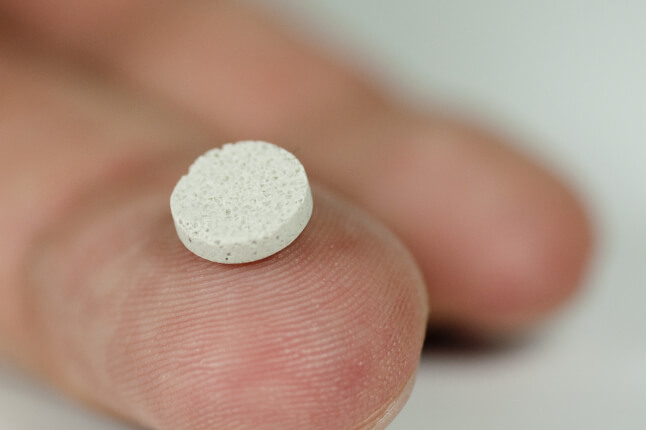News
Harvard iGEM Biohackathon gives life to creative solutions
Harvard iGEM held its second annual summer Biohackathon, “Hack Life 2018,” from June 29 through July 1, culminating in final presentations and an award ceremony on Sunday evening. Pre-formed teams of up to five undergraduates competed in four different tracks for first place prizes of $200. The tracks were: "Biology without Barriers," which encouraged students to find solutions to accessibility problems surrounding biology and health; "Code for Life," which encouraged students to design software or models to facilitate research methodology or computational biology; "Defending against Tropical Diseases," which encouraged students to come up with approaches to improve treatment or research cures of tropical diseases; and "Eco-Sustainability," which encouraged students to create prototypes or policies to address environmental issues.
Students with a wide range of different backgrounds and concentrations competed in the second annual Biohackathon at Harvard. (Photo courtesy of Harvard iGEM)
Although called a "biohackathon,” the broad tracks attracted about 50 students with a variety of majors, including bioengineering, chemistry, computational neurology, physics, and astronomy. Participants, a mix of Harvard students and those in Harvard-affiliated summer programs, hailed from across the globe, representing colleges such as Northwestern University and University of Bologna (Italy).
On June 29, iGEM co-presidents Cathy Wang, S.B. ’20, a bioengineering concentrator, and Unice Yoo, A.B. ’20, a chemical and physical biology concentrator, and treasurer Stephen Casper, A.B. ’21, introduced the club and shared logistics about the biohackathon, and the iGEM team spoke about synthetic biology and the ethics surrounding the field. Participants then met with their teams and worked throughout the weekend. Two online checkpoints were held on Friday night and Saturday afternoon, during which Wang and Yoo requested teams submit updates and questions on their ideas and research. On Sunday afternoon, teams presented PowerPoint presentations, and some demos, to judges. Each track had two judges, including Livio Valenti of Vaxess, Jie Zhu of Ginkgo Bioworks, Karthik Viswanathan of Visterra, Inc., Betsy Wonderly of Aldatu Biosciences, and Monique Brewster, Preceptor in Molecular and Cellular Biology, who asked questions after presentations, shared their expertise, and chose track winners.
Biohackathon judges listen as the student teams present the results of their work. (Photo courtesy of Harvard iGEM)
Team members Rachelle Ambroise, Joel Balkaran, Giulio Deangeli, Esther Elonga, and Cristiano Peron, won the “Biology without Barriers” category for devising an online diagnostic service where patients can rapidly upload their data and symptoms, and receive a diagnosis from doctors for the most common and relevant diseases. Alberta Boafo-Arko, Javier Morales-Ferrer, and Minh-Chau N. Le, won the “Code for Life” category for proposing a portable, soft robotic hand rehabilitation device that can track a stroke patient’s recovery progress. Azra Atabay, Liceyl Lenny Paulas Condori, Mert Mestanoglu, Uriah Sanders, and Julian Stanley won the “Defending against Tropical Disease” category for proposing to create an environment within the Chagas parasite vector that mimics the environment created by approved pharmaceutical treatments. Kanishk Mittal, Simon Shen, Eric Sun, and Kai Trepka won the “Eco-Sustainability: category for outlining the use of climate change biomarkers, which don’t rely on carbon-monitoring satellites, to find carbon emissions in the absence of direct monitoring. Click here for more information on all the team presentations.
"We started the biohackathon last summer because we realized there was a lack of biology-related competitions on campus and also in Cambridge. I'm really happy that there were so many people in the STEM community who came to work together and come up with great ideas that can potentially go on to be something greater if they form start-ups or publish more developed projects,” Wang said. “We would also love to build better relationships with industry and academic leaders. I enjoyed hearing judges' feedbacks and speaking to them afterwards about their diverse backgrounds and work."
More than 50 participants, hailing from across the globe and representing colleges such as Northwestern University and University of Bologna (Italy) gathered for the second annual Biohackathon at Harvard. (Photo courtesy of Harvard iGEM)
Harvard iGEM would like to thank the John A. Paulson School of Engineering and Applied Sciences and the Office of Undergraduate Research and Fellowships for generously sponsoring the Biohackathon for venue, food, and awards. Special thanks to all the judges who took time out of their busy schedules to listen and speak to passionate students and to iGEM Club officers Stephen Casper and Ralph Estanboulieh, who helped a lot with publicity, catering orders, and technological set up.
Topics: Bioengineering, Events, Student Organizations
Cutting-edge science delivered direct to your inbox.
Join the Harvard SEAS mailing list.


